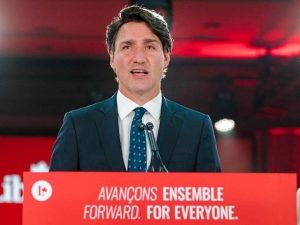Canadians returned Liberal Prime Minister Justin Trudeau to power on Monday in hotly contested elections against a rookie conservative leader, but he failed to gain an absolute majority, according to projections by television networks.
Trudeau called the snap election last month, hoping to parlay a smooth Covid-19 vaccine rollout — among the best in the world — into a new mandate to steer the nation’s pandemic exit and pass his agenda without opposition support.
But after a bumpy five weeks of campaigning, his voice was raspy and he appeared set for a repeat of the close 2019 general election that resulted in the one-time golden boy of Canadian politics clinging to power yet weakened after losing his majority in parliament.
At 49, Trudeau had faced tougher political bouts and still came out unscathed.
After six years in power, however, his administration is showing signs of fatigue, and it was an uphill battle for him to convince Canadians to stick with his Liberals after falling short of high expectations set in his 2015 landslide win.
“You are sending us back to work with a clear mandate to get Canada through this pandemic,” Trudeau told supporters in Montreal.
“I hear you when you say you just want to get back to the things you love and not worry about this pandemic or an election.”
Trudeau ‘lied to us’
Throughout the day, long lineups outside polling stations were observed by AFP journalists in several major cities.
Douglas O’Hara, 73, casting a ballot in Trudeau’s Montreal electoral district of Papineau, said earlier that he was “very disappointed” with the prime minister.
Although he believes Trudeau “did a half-decent job” managing the pandemic, he recalled that the leader had pledged not to go to the polls until the outbreak had subsided.
“Then as soon as he gets a chance (when) he thinks he’s going to get a majority, he calls an election,” O’Hara said. “I really believe he lied to us.”
In Ottawa, Kai Anderson, 25, said Canada’s pandemic response was her “number one” issue. “I think the prime minister did a good job managing the pandemic,” she said.
Liz Maier, 72, of Vancouver said she too hoped for a Trudeau win for “consistency in leadership” during the public health crisis.
Entering the final stretch of the contest, Liberals and Conservatives — the two main political parties that have ruled Canada since its 1867 confederation — were virtually tied, with about 31 per cent support each in public opinion polls, and four smaller factions nipping at their heels.
Pollster Tim Powers predicted a Liberal minority win.
“But is that a win for him?” he said, noting that Trudeau had hoped for more than just a plurality of seats.
“In the end, this election was ultimately for nothing,” University of Winnipeg politics professor Felix Mathieu told AFP, pointing to the projected seat count for each party as being similar to the split in the last parliament, with most incumbents re-elected.
‘Anti-vaxxer mobs,’ China ‘counterstrikes’
The campaign saw the contenders spar over climate actions, indigenous reconciliation, affordable housing, mandatory Covid-19 inoculations and vaccine passports.
At rallies, Trudeau was dogged by what he described as “anti-vaxxer mobs,” including one that threw stones at him.
The 48-year-old Conservative leader Erin O’Toole, meanwhile, was knocked for his backing of Alberta and two other Tory-led provinces’ loosening of public health restrictions too soon, with Covid outbreaks now forcing their overwhelmed hospitals to fly patients across Canada for care.
He also fumbled over gun control and was warned by Beijing, according to Chinese state media, that his proposed hard line on China — Canada’s second-largest trading partner, with whom relations have soured over its detention of two Canadians — would “invite counterstrikes”.
Overall, commented Max Cameron, a politics professor at the University of British Columbia, “this hasn’t been a polarising election. There’s actually a lot of clustering around the middle.”
O’Toole, a relative unknown who became Tory leader only last year, had tracked his party to the political centre, forcing the Liberals to compete for votes on the left with the New Democrats and Greens, as well as the separatist Bloc Quebecois.
The Conservatives, however, also saw their support clawed by former foreign minister Maxime Bernier’s far-right People’s Party.










Comments